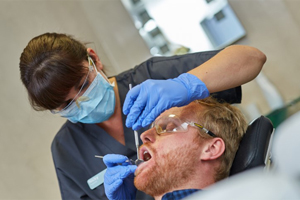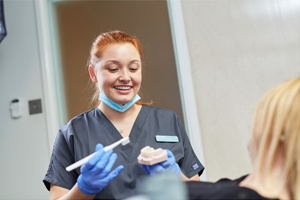Keeping your teeth clean and gums disease-free is vital for your long-term health. At South Lane Dental, we recommend dental hygiene to patients of all ages. We have a highly motivated, extensively trained hygiene team whose sole aim in the practice is the prevention and treatment of gum disease.
Working in partnership with your dentist, our hygienists play a vital role in the successful prevention and treatment of gum disease. They will closely monitor the health of your mouth, thoroughly ‘clean’ your teeth and offer advice on how to maintain good oral hygiene at home.
Our hygienists provide patient-oriented treatment with an approachable manner to put nervous patients at ease.



During your dental hygiene appointment, your hygienist will ask you about any problems or concerns, discuss your medical history and oral health, and check the appearance of your teeth and gums.
Dental hygiene at our practice also functions preventatively to treat gum disease and bad breath. If you have a bridge, denture, orthodontic treatment or a dental implant you will have specific hygiene needs that the hygienist will be able to assist you with.
We also offer Air Polish either as an addition to your regular hygiene appointment or as an interim appointment if you get a lot of dental staining. This is purely a cosmetic treatment and your hygienist can let you know if it is suitable. It is recommended that you come in for regular hygiene appointments to ensure your mouth stays clean and healthy.
Periodontics is a branch of dentistry that deals specifically with conditions affecting the gums and soft tissues that support your teeth. It is the treatment of periodontal disease (an advanced form of gum disease) and other inflammations of the mouth.
Gum disease begins as gingivitis, with common signs including blood on the toothbrush when you brush your teeth. You should contact your dentist or hygienist immediately if you experience such symptoms, as gum disease is best treated early. Left untreated, gingivitis can become periodontitis, which is much more serious.
Periodontitis affects the soft tissue that holds the teeth in place and can cause the gums to start separating from the teeth. The condition can also spread to the jaw bones, which can start to dissolve, leading to tooth loss. It usually takes some years for periodontitis to develop, and you should make an appointment with the dentist or hygienist if you are experiencing any of the following symptoms:
Fields with (*) are required.
Please contact us via this website or email without disclosing confidential information.